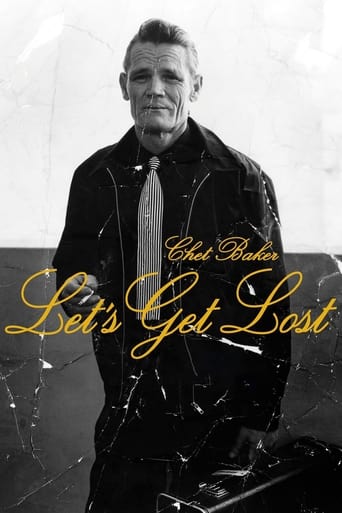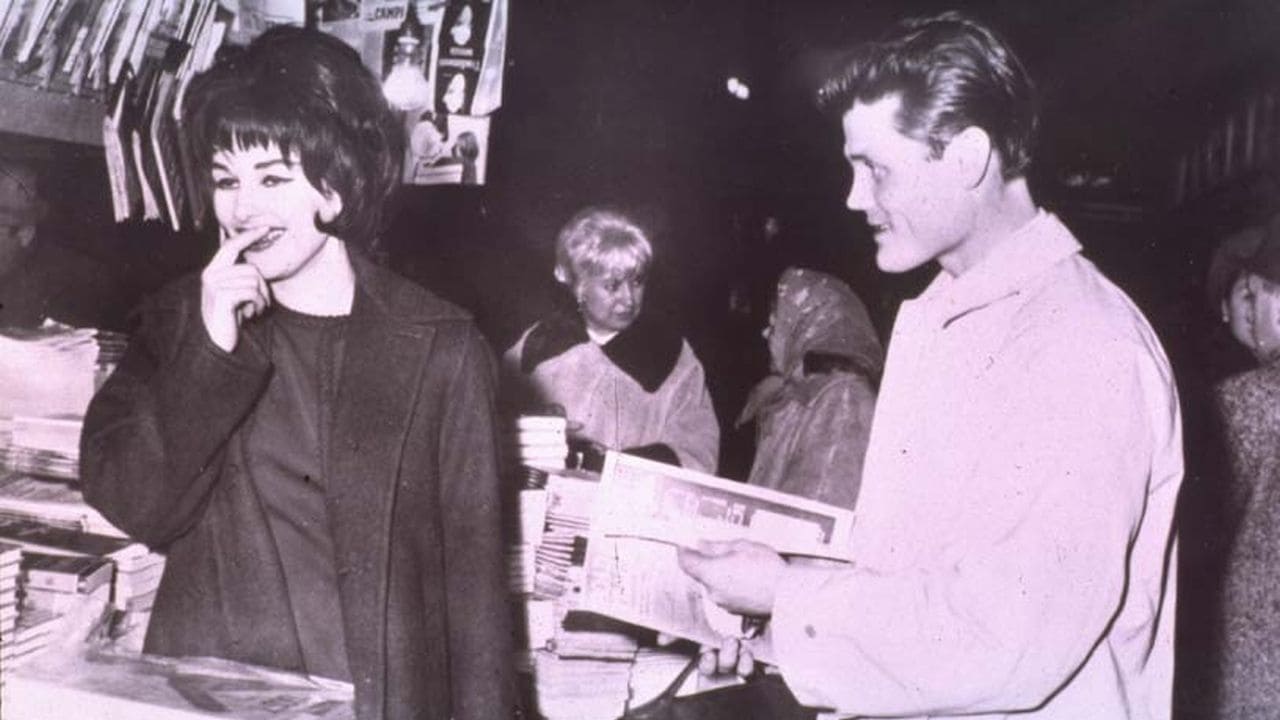purrlgurrl
Beautifully filmed by a fashion photographer, Bruce Weber, nevertheless the ugliness of Chet Baker's life overtakes the beautiful images on screen. In Western culture, we equate physical beauty and/or exceptional talent with a depth of soul and substance that are often lacking if we look closely with cool objectivity at those we idolize for those traits. Great beauty or great talent aren't always bestowed on the good or the worthy, and Baker is evidence of that. He was a manipulative drug addict who likely would have wound up a petty criminal if he didn't incidentally have much more than a passing musical talent. It didn't hurt that when he was very young he also had the chiseled good looks of a movie star, looks later ravaged by decades of heroin use. Interviews with the women in his life reveal a strung out moocher who knew how to use their obsessions with him to support his drug habit, taking advantage of their romantic projections of a tortured soul onto a loser with some musical talent. One of them, jazz singer Ruth Young, states flatly that for Baker music was just a way to get drugs. In an interview with Baker at the end of the film, Weber asks about his current state of constant pain due to being cut off from drugs until he gets to Amsterdam. Baker refuses to rise to the bait and open up about the destruction addiction has wrought in his life. Ironically, Baker subsequently jumped, fell or was pushed to his death from his hotel window in Amsterdam. The film appears to have been meant as an homage to Baker, but instead reveals the ugly little drug addict he was. There is another myth in Western culture, the myth that in order to create the mind must be unfettered through use of drugs. After watching this, one can't help but wonder how much of Baker's creativity and talent were stunted rather than enhanced by heroin.
st-shot
Photographer Bruce Webber's Let's Get Lost featuring trumpeter Chet Baker on his last legs is like looking at a car wreck. The devastation is riveting. The highly talented Baker burned out and as we eventually find out still using, matter of factly goes over a self destructive career that also saw success as a singer with some film acting thrown in. But for Baker the heroin was every bit as important as the horn. Family, friends and gigs all took a back seat to it and interviews with ex-lovers, band mates and even his mother recount the disappointment he was to all. Lost' form is overly stylized at times and Webber allows some scenes to run over ( a ride with friends in a Caddy convertible is far too long) but with the enigmatic Baker (vacillating between lucid and in a fog) at its center it remains absorbing most of the way. Critical assessment is pedestrian and comparisons to Miles Davis just doesn't wash since Baker's career peaked early and never recovered due to his substance abuse. His unique singing style (My Funny Valentine) is what he is remembered most for today and while this is a film that comes to praise Baker where it can (Webber and he seem to bond during the filming) it ultimately buries him, announcing in post script that a year later he will fall to his death from an Amsterdam hotel window. As Chet would have said, "What a drag, man."
stuhh2001
We have to be grateful to Bruce Weber for giving us this film. Monetary gain could not have figured in on it, as jazz, in spite of the great artists it produces, could never attract the amount of people to make a venture like this profitable. The big bands of the thirties and forties had jazz musicians as members, and did incorporate some jazz solos in their arrangements, but could not be considered a jazz venue. They generated millions of dollars, because the dancing public was so vast, there was no TV, and the leaders were groomed to be lionised like movie stars. (See "The Trouble With Cinderella", Artie Shaw's autobiography on his disenchatment with stardom. Jazz was played in small clubs seating at the most two hundred people, while dance halls could accommodate as much as fifteen hundred dancers. Any footage of an important icon like Chet is welcome, but some scenes are not what they seem. The recording session is a staged event to simulate a record date. The opening scene on the beach sans Chet is gatutitous. Maybe Weber wanted to show the local Southern California beach scene that Chet loved. The scene in an amusement park with a stoned Chet on the "Dodgem" cars is puzzling. "Chet's women" add a great deal of interest to the film. His mother describes how the toddler Chet was transfixed by the sound of the big bands on the radio. Ruth Young daughter of a wealthy Hollywood producer, smitten with Chet and jazz, describes with an unusual lack of bitterness, the insane life of loving a junky, who was really in love with her inheritance and heroin, and made short shrift of her money to finance his drug taking. She sings briefly in the film and I thought showed great promise, but she failed to seek a career in music. Diane Vavra had no money for Chet to squander, but she filled in as someone knowledgable about music to help Chet. Carol Baker, "the long suffering wife" (and how she suffered) gave Chet three beautiful children, who Chet barely noticed, or provided for in his chaotic race to the grave. With all that said, what about the music? Well I can tell you that in an era of great heroic trumpet superstars, like Dizzy Gillespie, Roy Eldridge, Maynard Ferguson, and many others, who could dazzle you with notes in the highest register of the trumpet, and improvise incredible melodies in the upper register, and "scream" above a roaring fifteen piece band, Chet was not in that mode at all. He rarely practiced, had no high register, but wove a soft filagree of delightful improvisations on standard popular songs. In my opinion he reinvented trumpet playing in the fifties. His playing said, "Dizzy's great, but I do it this way." His movie star looks did not hurt his appeal one bit, and his singing which has many detracters, I think will prove to be more appreciated in years to come. I loved every note he played and sang when I first heard him in the fifties, and my appreciation and love for this man, grows every year.
mseditrix
Let's Get Lost could have so easily been done badly. Intense fandom doesn't often make for objectivity, and the tragic-artist-gone-to-seed narrative is so, so tired. But this film kicks those limitations right over. It's tough about the ugly facts of Chet Baker's life as a liar, user, and junkie. At the same time, it never allows the viewer to forget the intense beauty Baker created as a musician, and embodied as a young man of perfect allure.
There are images I'll never forget: the expressions of his family as they listen to his music, his ex-wife lost in remembered pleasure; his daughter, pained; his dead-ringer son, uncomfortably smiling. The older, ravaged Baker, in the back seat of a convertible with two women, murmuring to them like he's in a dream. The stills of he and his second wife, both so stunning and so clearly in love, burning for each other. And more than that, the music, aching and romantic, and always so lonely, always about longing for some woman in some place that's beyond reach.
I am grateful to Bruce Weber for creating this film. It's why I go to the movies like some people go to the mountains or the sea, to church or to some lover's arms: it got me lost.



 AD
AD


